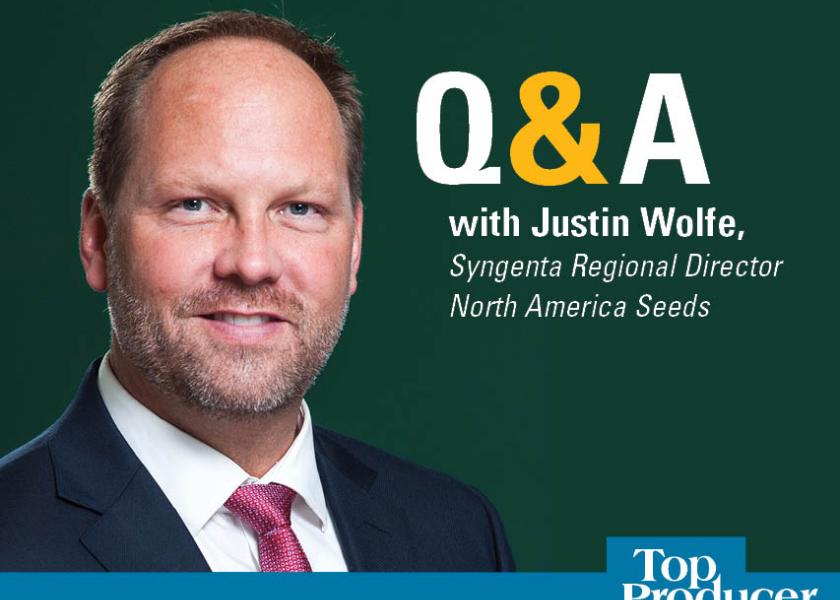Syngenta’s Justin Wolfe Talks Seeds, Global Agriculture and More

Q&A with Justin Wolfe, Syngenta Regional Director North America Seeds
Company: With global headquarters in Basel, Switzerland, Syngenta is a crop protection, seeds, seed treatments and traits company formed in 2000. Its global sales hit $13.6 billion in 2019. Syngenta employs 28,000 people in 90 countries.
Education: Business degree from Montana State University, executive master’s degree in international business from St. Louis University.
One book managers must read: “The Tipping Point” by Malcom Gladwell. It really explains how the little things make a big difference.
Business leader you admire: Warren Buffett. He’s a little quirky, but brilliant, with incredible energy and huge integrity. He seeks these traits in people he hires.
What is your background?
Farming is in my blood. I grew up on a family farm in northern Montana. We grew hard red winter wheat and spring wheat. My great-grandfather on my father’s side was a homesteader there and my grandfather on my mother’s side also had a farm.
Share your career path.
Growing up on a farm, I didn’t think I would get back to farming. After college I started with a copier company. I quickly moved back into agriculture with a fungicide company, which oddly enough was sold and became part of Syngenta. Then I joined Monsanto and spent 21 years, traveling all over the U.S. I also lived the past eight years internationally in three different countries. About half of my career has been in sales and commercial roles with the other half in marketing and strategy. I joined Syngenta in September of 2018 and am responsible for the entire row crops seed business in North America.
What are the top challenges facing your business?
We’re in unprecedented times: a global pandemic, regulatory pressures, challenging commodity prices, political uncertainty and trade challenges and a need to farm more sustainably. Farmers, now more than ever, need support, innovation and good options to be successful. To keep things moving forward, we’re having to do this in creative ways, such as social-distanced plot tours and Zoom meetings.
What are the challenges in developing new products?
You have to take a long view in this business. On average, it can take 10-plus years to bring a new piece of biotechnology to market. With gene editing, developing good trait options will increase and the timeline to market will be reduced.
“Every time I see farmers from around the globe connect and share ideas, they learn from each other.”
What exciting changes are ahead in seed technology?
No question, gene editing is an exciting tool. The big area we’re focused on is digital decision science and predictive analytics, which will help take the guesswork out of product placement. It will help reduce trial and error for farmers and increase productivity. We’ve made a $400 million commitment to the U.S. business, with one of the areas being in seed R&D and innovation. An example is our planned R&D Innovation and Customer Experience Center in Malta, Ill.
What are your keys to motivate employees?
I subscribe to the golden rule: Treat others how you want to be treated. Always look at things from their perspective. Think and act with their point of view in mind, so you can provide clear direction and give them the autonomy to do their thing. Hire people with integrity, energy and intelligence. You can’t necessarily train for those traits.
What should U.S. farmers know about agriculture in other countries?
The two things from my international experience U.S. farmers should understand are:
- Don’t take for granted the technology in the U.S. It is a big privilege, and it helps farmers here maximize productivity. European farmers don’t have access to all the same technologies, and farmers in Eastern Europe do not have subsidies either. So farmers there are forced to manage their operations differently and be very creative.
- I see opportunity for farmers globally to connect and share ideas with each other. Every time I see farmers from around the globe connect and share ideas, they learn from each other.
What are some of the best practices you’ve learned?
Never stop learning. Surround yourself with people who are smarter than you. Do business with those who value the integrity of a handshake.
In its series “View From the Top,” Top Producer explores business ideas from company leaders both within the ag industry and outside of agriculture.Have an idea for someone to spotlight? Email Sara Schafer at sschafer@farmjournal.com.







